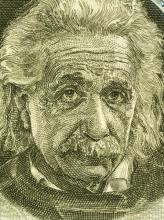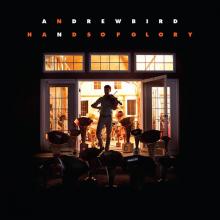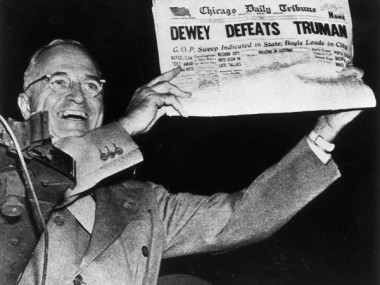Culture
Stephen Colbert, a practicing Catholic and sometimes CCD teacher, does a "liturgical dance" number to the hymn, "King of Glory." You're welcome.
There are some artists whose work leaves you walking away thinking, “How in the world did they do that?” The Yeasayer performance at the 9:30 Club in D.C. on Nov. 15 was one such performance.
The psychedelic electro pop group hailing from Brooklyn pumped out a wholesome set of favorites from its older releases as well as songs from its recent — and divisive — album Fragrant World, all to the backdrop of what looked like a chunk of the Epcot ball from Disney World.
But the elaborate — and frequently trippy — back drop and light show seamlessly augmented the synth-laden songs, morphed electric guitar, and catchy hooks. It was truly and audiovisual experience. Had their performance included some neon gummy worms or something, it would have engaged nearly every sense.

VATICAN CITY -- Their lives steeped in intrigue, treason and lust, and set against a backdrop of luscious Italian landscapes and Renaissance masterpieces, the Borgias are probably the most famous -- or infamous -- family in the long history of the papacy.
Now, a new Italian book wants to dispel, at least in part, the “black legend” surrounding a dynasty that bore two popes as well as cardinals, poets, and warriors.
Journalist and historian Mario Dal Bello drew on documents from the Vatican Secret Archive to write his new book, I Borgia: La leggenda nera, or The Borgias: The Black Legend.
For five centuries, the Borgias have attracted writers, painters and playwrights. They have been the subject of hundreds of movies and TV productions, most recently Showtime's popular series, The Borgias.
“It's easy to understand why: sex, blood, poison, power,"" Dal Bello said. "This is already fiction material."

In search of a story that will “make you believe in God?”
It’s a heavy undertaking. Kind of like trying to adapt that story to film, as screenwriter David Magee and director Ang Lee did brilliantly in Life of Pi, which opens nationwide today.
The film, adapted from Yann Martel’s moving book, takes on massive questions — who is God, how do we find God, and why do bad things happen to us — as we follow Pi, a zookeeper’s son shipwrecked on a lifeboat with a Bengal tiger.
“I think we’re humble filmmakers — I don’t think we can answer why bad things happen to people,” Magee told Sojourners Tuesday. “But I do think it puts into perspective the fact that within every ordeal there is a lesson.
“This is very much a story about storytelling,” Magee added. “It’s very much a story about how those different narratives help us get through. It can’t promise to answer why we go through the things we do, but it can say what we take away from them.”

Editor's Note: Trevor Scott Barton wrote this poem after reading Subtle Is The Lord: The Science and the Life of Albert Einstein by Abraham Pais.
Einstein
experiencing a miracle
trembling with excitement
a compass
sparking genius
creating a world of thought
Euclidian Geometry in a small book
flying certainly away from the miraculous
finding the miraculous in clarity and certainty
gravity
Rydberg's Constant = 2π2em/h3c
landing uneasily in chaos
wandering and wondering in the quantum universe
God playing symphonies on strings

Among my must reads are the Sunday New York Times Book Review and other book reviews I come across in various media outlets. There are too many books being published that I would love to read, but just don’t have the time. So, I rely on reading book reviews as one way of keeping in touch with what’s being written. Here are my picks from this week’s books.
It’s not unusual to hear someone rapping about clothes — and how expensive theirs are — on the radio these days. Consider Jay Z and Kanye West’s collaboration “Otis,” where Jay Z belts, “Photo-shoot fresh, looking like wealth / I'm 'bout to call the paparazzi on myself.”
And if you don’t hear about their diamond studded jewelry and designer clothes, some rappers aren’t shy about showing them off in music videos.
But Seattle-based hip hop group Macklemore and Ryan Lewis, who recently hit number one on the iTunes album charts and stopped by D.C.’s 9:30 club on Nov. 13, chose a different approach to the whole clothing concept and, for the most part, hip hop in general.

If you were overwhelmed by all that election business, you might have forgotten that October just happened, and with it came a new release from one of my personal favorite musicians, Andrew Bird.
Hands of Glory, Andrew Bird’s latest record and companion to March’s Break it Yourself, is the product of a pair of recording sessions prompted by an immense response to Bird’s “old-time” sets on recent tours.
Reinterpreting songs from Break It Yourself and featuring covers of classic country tunes, these “old-time” performances find Bird and his full band playing to a single microphone with an entirely acoustic setup.
Drawing inspiration from these sets, Hands of Glory features two brand new original tracks, a new interpretation of “Orpheo Looks Back” from Break It Yourself and covers of Van Zandt, the Handsome Family, Alpha Consumer and others.
The results are fantastic.

Once there was a crowd of about 2,000 shoppers gathered for the early morning opening of a local Wal-Mart.
It was the morning after Thanksgiving Day in Valley Stream, New York, an occasion commonly known as “Black Friday” throughout the United States.
As the opening hour of operation approached, the crowd grew quickly in size, but it also increased with anxiety and anger, as many had waited throughout the cold and dark night, some as long as eight hours. The masses were more than ready to move into the warmth, brightness, and seasonal buying bliss of their neighborhood Wal-Mart.
When the store manager finally unlocked the front entrance, the massive and eager crowd erupted with energy and passionately pushed into the store like a tidal wave. In doing so, through the sheer physical force of mass purchasing power, the swarm of shoppers broke through – and eventually broke down – the Wal-Mart doors.

Abraham Lincoln was a storyteller, so it’s fitting that his story has been hashed out on the silver screen — without vampires.
And to say that it simply was “hashed out” would be an injustice to director Stephen Spielberg and everyone who contributed to Lincoln, a film that will be remembered as much for its beauty as the iconic character from which it gets its name.
I’m not going to lie (pun intended), even though Lincoln is one of the most important figures in American history, I was hesitant about seeing a movie with the potential to be a two-and-a-half hour history class.
But I was more than pleasantly surprised.
Despite its length, the film drew me in and held my attention — even as a millennial growing up with the Internet, which I’m convinced has significantly chipped away at the already small attention span I have.
 From the Man in Black to the Beastie Boys and everything in between -- we give you a little compilation of video salve to help you get through election night.
From the Man in Black to the Beastie Boys and everything in between -- we give you a little compilation of video salve to help you get through election night.

Steve Taylor, film director and rock hero, visits our (mine and Jordan Green's) Homebrewed Christianity podcast to talk about the disappointing theater run of his film, Blue Like Jazz, what made him leave music for film, and to announce his return to music through a new album he’s been working on.
So, yeah, that’s a big deal. And yeah, we’re pretty much breaking the story.
In the Echo Chamber, we talk about the election, Superstorm Sandy, scary movie commercials, and, you know, a bunch of other stuff. Finally, we discuss some common Christian cliches.
Listen ... inside the blog.

Among my must reads are the Sunday New York Times Book Review and other book reviews I come across in various media outlets. There are too many books being published that I would love to read, but just don’t have the time. So, I rely on reading book reviews as one way of keeping in touch with what’s being written.
Here are my picks from this week’s books.

BELATED CONGRATULATIONS to Jesus Christ after recent research revealed that he might have been married during his short life. (Although, if he had to help with the dishes every night, it might have seemed longer.)
My immediate reaction was to wonder what you get a deity for a wedding present, even though it’s way too late. Their Pottery Barn listing is probably out of date, but that might be for the best, since all the cheap stuff would have been taken by now. (My oldest daughter is getting married next year, so I speak from experience that you’ve got to get in there fast and sign up for that salt shaker. Otherwise, you’re stuck buying an entire set of towels, or a food processor. She’s my daughter, but one must draw the line.)
Trying to get your head around the idea that the shortest verse in the Bible should be “Jesus wed,” the whole thing seems a little farfetched, but you can’t argue with possible science. Harvard Divinity School professor Karen L. King claims that a 4th-century papyrus fragment, written in the Coptic language of Egyptian Christians at the time, makes a reference to Jesus’ “wife.” King presented her findings at a recent gathering of the International Congress of Coptic Studies, which doesn’t seem like the kind of gathering that generates much Twitter traffic, unless there’s a private party in one of the rooms. (“Would you like to come upstairs and see my papyrus fragments?”)
From what I can tell by the photos, the handwriting on the fragment looks like a shopping list I’d hurriedly written out and then couldn’t read when I got to the store. Not having the foresight to bring along a Coptic translator, I’d invariably forget that one thing the family really needs. I wonder if Jesus had to put up with the same condescending looks when he brought home the wrong stuff. Okay, probably not.
EARLIER THIS year, the Interfaith Partnership of metropolitan St. Louis held a public panel presentation addressing three Abrahamic religions—Judaism, Christianity, and Islam—on war and peace. Members of Interfaith Partnership and interested people from the community filled the chapel at Eden Theological Seminary to hear a Jewish scholar, a Muslim academic, and a Christian theologian (me) offer brief presentations on how our respective faith traditions value peace, as well as why, when, and how each religion views the use of violent force as sometimes morally justified.
During the question-and-answer period, I highlighted how in recent years both nonviolent and just war Christians have worked together on an approach, known as just peacemaking, for dealing with the underlying causes of war and thereby preventing its outbreak. As is often the case when I talk on this topic, most persons in the audience seemed unfamiliar with just peacemaking. After I attempted to clarify it further, someone asked the panel if other religious traditions had anything comparable to just peacemaking. The answer is yes, at least for Judaism and Islam, as shown in Interfaith Just Peacemaking, edited by Susan Brooks Thistlethwaite, a theologian and ordained minister in the United Church of Christ.
The 10 proactive practices that have been empirically proven as realistic and effective ways for preventing many wars form the framework for Interfaith Just Peacemaking. They were first identified in Just Peacemaking: The New Paradigm for the Ethics of Peace and War, edited by theological ethicist Glen H. Stassen. That book’s 23 contributors (scholars and practitioners from multiple disciplines—theology, political science, psychology, and history—and from pacifist and just-war perspectives) shared concerns about how just war has devoted insufficient attention to dealing with catalysts that lead to conflict (and not making war truly a last resort) and about how pacifism has failed to offer clear guidance about practical alternatives to war.
OURS IS AN age of interaction, mobility, and change. Unlike most of our grandparents, many of us have moved several times in our lifetimes and have seen our neighbors move in and out. We are more intensely aware, even in our own neighborhoods, that our kind of faith is not the only kind. We see how others have been shaped by very different histories than our own. It becomes clear to us that we, too, have been shaped—and continue to be shaped—by our own history.
Fuller Theological Seminary, where I teach, is in California. Every now and then we feel the ground shifting. The chandelier in our dining room swings or the bed on which we are lying begins to rock. The whole world may not be experiencing little earthquakes as we are, but people are surely experiencing change and variety in faiths and ideologies. This change and diversity can rock a person’s faith. We ask, How do we validate the truth of what we perceive and what we believe? In our time of pluralistic encounter with multiple ideologies and religions and with rapid social, economic, and political change, people search for what Dietrich Bonhoeffer called solid ground to stand on.
Philip Clayton teaches at Claremont Theological Seminary in California. He attended the mainline Presbyterian church that had been his church home since elementary school, plus an evangelical Bible study group, a charismatic prayer meeting once a week in a Pentecostal church, the Assemblies of God church, and a community of “Jesus People.” He writes:
Most of us know friends, colleagues, or acquaintances who are Christian, Jewish, Muslim; Buddhist, Hindu, Taoist; atheist, agnostic, “doubting believers”; pantheist, panentheist, neo-pagan; Mormon, Jehovah’s Witness, Church of God; Baha’i, Zoroastrian, perennialist—the list goes on and on. Faced with such a confusing array of options, more and more Americans are choosing not to choose ... You have to admit, pretty much everything these days is up for grabs. We are in the midst of the most rapid social and technological change that our species has ever undergone.

THE MASTER, Paul Thomas Anderson’s stomach-punching, fingernails-down-a-chalkboard psychological thriller loosely based on the founding of Scientology, might be more deeply understood as a tale of two egos. We witness a titanic battle for self-control by a man who knows nothing of it (Joaquin Phoenix’s Freddie Quell), while another struggles to distinguish imagination from delusion, his simmering rage emanating perhaps from the terror that the truth he has found may not be enough (Philip Seymour Hoffman’s L. Ron Hubbard surrogate, Lancaster Dodd). Neither of them knows how to love; both are desperate to be loved. They find in each other a conversation partner, a patient, an unrequited lover. They are two of the most human characters the movies have brought us in a long time; their power trips are terrifying, because they may remind us of our own.
There are many key moments: The first meeting between the war veteran and new religious leader, the dictator bonding with his subject over mutual substance abuse; the master holding court in New York society, first offering tender words of potential healing to a grand dame, then exploding at a guest who dares question the source of his “knowledge”; the protégé being experimented with, commanded to walk up and down between a wall and a window until he is both capable of imagining unbridled freedom and driven nearly mad in the process; a science-fictionesque digging for buried treasure on Arizona flatlands that could pass for Mars.
The moment that remains most resonant in my memory after two viewings is still the most ambiguous to me. After Freddie and Dodd first meet, the new father invites the new son (the relationship—and failings of relationship—between fathers and sons is where this film really aches) to attend his daughter’s wedding. The invitation is accompanied by a warning or an invocation: Dodd tells him either “Your memories aren’t welcome” or “Your memories are welcome.” Two viewings leave it unclear—I could check a third time, but it doesn’t really matter, for each is a blessing. You don’t have to carry your trauma always and everywhere. Or you can join this community and still be fully yourself.
Outrunning Despair
In the novel Running the Rift, by Naomi Benaron, a young Tutsi runner in Rwanda dreams of competing in the Olympics even as political tensions erupt into unfathomable violence. A story that gives both horror and hope their due. Winner of the 2011 Bellwether Prize for Socially Engaged Fiction. Algonquin
Finally, a "Christian Unicorn"
Perpetually quirky indie artist Sufjan Stevens’ new 58-track, 5-EP Christmas collection Silver and Gold promises to offer “holly-jolly songs of hope and redemption.” Not your typical Christmas music, but who needs more of that anyway? Liner notes include essays by Stevens and Vito Aiuto of The Welcome Wagon. Asthmatic Kitty

SINGER-SONGWRITER Caroline Herring was completely naked when she truly found God.
Straight out of college, she spent three months as a missionary in China. “I was so ill-equipped,” she says now, over tea just before a show in Knoxville, Tenn. “The program was respectable—we weren’t Bible smugglers, but obviously we had an agenda.”
One of her students—a woman who had journeyed seven hours to attend English classes Herring was teaching with her fellow missionaries—took a liking to her and asked if she would leave the comfort of her air-conditioned room (with a private toilet) to join her students at the dirty, crowded bath-house, outfitted with several spigots in the ceiling. Herring believes it was a way to welcome her into their fold.
“And I felt like I was a part of humanity for the first time in my life,” Herring says, her face suddenly luminous. “My preconceived notions about the Trinity just slipped away. It was too much to comprehend, but I knew that the Holy Spirit was moving amongst us because we were people together, being kind to one another.”
Herring, now 42, says the experience changed her life. She left China a different, humbled person, with whole new ideas about what God, religion, and service were.
“I knew for sure that I had a lot more to figure out about my own place in the world before I had the audacity to spread the word of Christ across the globe,” she says.